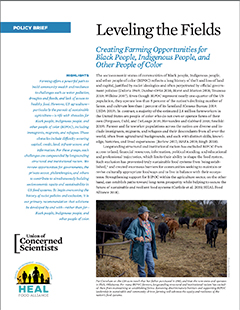Farming offers a powerful path to build community wealth and resilience to challenges such as water pollution, droughts and floods, and lack of access to healthy food. However, US agriculture— particularly the pursuit of sustainable agriculture—is rife with obstacles for Black people, Indigenous people, and other people of color (BIPOC), including immigrants, migrants, and refugees.
These obstacles include difficulty securing capital, credit, land, infrastructure, and information. For these groups, such challenges are compounded by longstanding structural and institutional racism. We review opportunities for governments, the private sector, philanthropies, and others to contribute to simultaneously building socioeconomic equity and sustainability in US food systems.
To begin overcoming the history of racist policies and exclusion, it is our primary recommendation that solutions be developed by and with—rather than for— Black people, Indigenous people, and other people of color.
